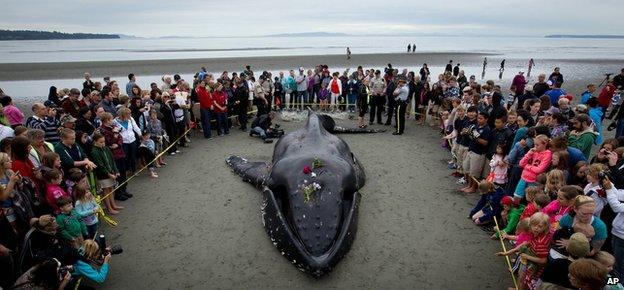Governments make 'pitiful' progress on oceans
- Published

Scientists say the failures of governments to pursue 20-year-old ocean conservation goals are plain to see
Little has been done to protect marine life since the 1992 Rio Earth Summit, conservation scientists conclude.
On pledges to protect key habitat and restrict the size of fishing fleets, they say progress has been "pitiful".
Their analysis is carried in the journal Science and is being discussed during final preparations for the <link> <caption>Rio+20 summit</caption> <url href="http://www.uncsd2012.org/" platform="highweb"/> </link> , which opens next week.
Conservationists were delighted by Australia's move to set up <itemMeta>news/world-asia-18437040</itemMeta> .
But globally, the picture is bleak, they say.
"Our analysis shows that almost every commitment made by governments to protect the oceans has not been achieved," said Jonathan Baillie, director of conservation at the Zoological Society of London (ZSL).
"If these international processes are to be taken seriously, governments must be held accountable and any future commitments must come with clear plans for implementation and a process to evaluate success or failure."
Progess reviewed
In Rio de Janeiro, leaders will be peering intently at how oceans play into global sustainability
The researchers assessed the various pledges made at the landmark 1992 Earth Summit and 10 years later at the Johannesburg World Summit on Sustainable Development.
Governments vowed to establish an ecologically sound network of marine reserves by 2012, eliminate subsidies that contribute to illegal fishing, protect critical habitat, look after the needs of local fishermen and restore depleted stocks to healthy levels by 2015.
Subsidies have not been eliminated, and illegal fishing is still a major issue in some parts of the world.
Little over 1% of the seas are protected. Two years ago, governments agreed to raise that to 10% by 2020, but the new analysis shows that at the current rate of progress, the world is off course to meeting that target.
The pledge to restore stocks to healthy levels by 2015 has also seen slow progress. European ministers meeting earlier this week voted to give themselves until 2020 to achieve the target in EU waters.
The latest exception to this rather gloomy picture emerged earlier this week, when the Australian government announced it was creating a network of marine reserves around its shores that will cover 3.1 million sq km of water, including the ecologically rich Coral Sea off the Queensland coast.
Coming just before ministers arrive in Rio, conservationists hope it will inspire other countries to commit to strong safeguards.
Commitment concern
Oceans are one of the major themes of Rio+20.
The "package" of outcomes that government negotiators are discussing includes agreeing to establish marine reserves in international waters, agreeing on equitable use of the oceans' genetic resources, and western help for poor countries on technology.
A decision to phase out harmful subsidies is also possible.
But over the various rounds of preparatory talks that began six months ago, there has been little indication that all governments are keen on these moves.
The US is against pledging to share ocean genetic resources equitably; developing countries say that without such a pledge, they will not agree to protected areas on the high seas.
"We're worried that some countries are starting to back off commitments that they made 10 years ago in Johannesburg," said Sue Lieberman, director of international policy at the Pew Environment Group.
"But there is still time for countries to move beyond what they agreed to in 2002, especially on the high seas," she told 成人快手 News.
Follow Richard <link> <caption>on Twitter</caption> <url href="http://twitter.com/#!/成人快手RBlack" platform="highweb"/> </link>
- Published14 June 2012
- Published14 June 2012
- Published27 January 2012
- Published13 June 2012
- Published12 June 2012
- Published11 June 2012